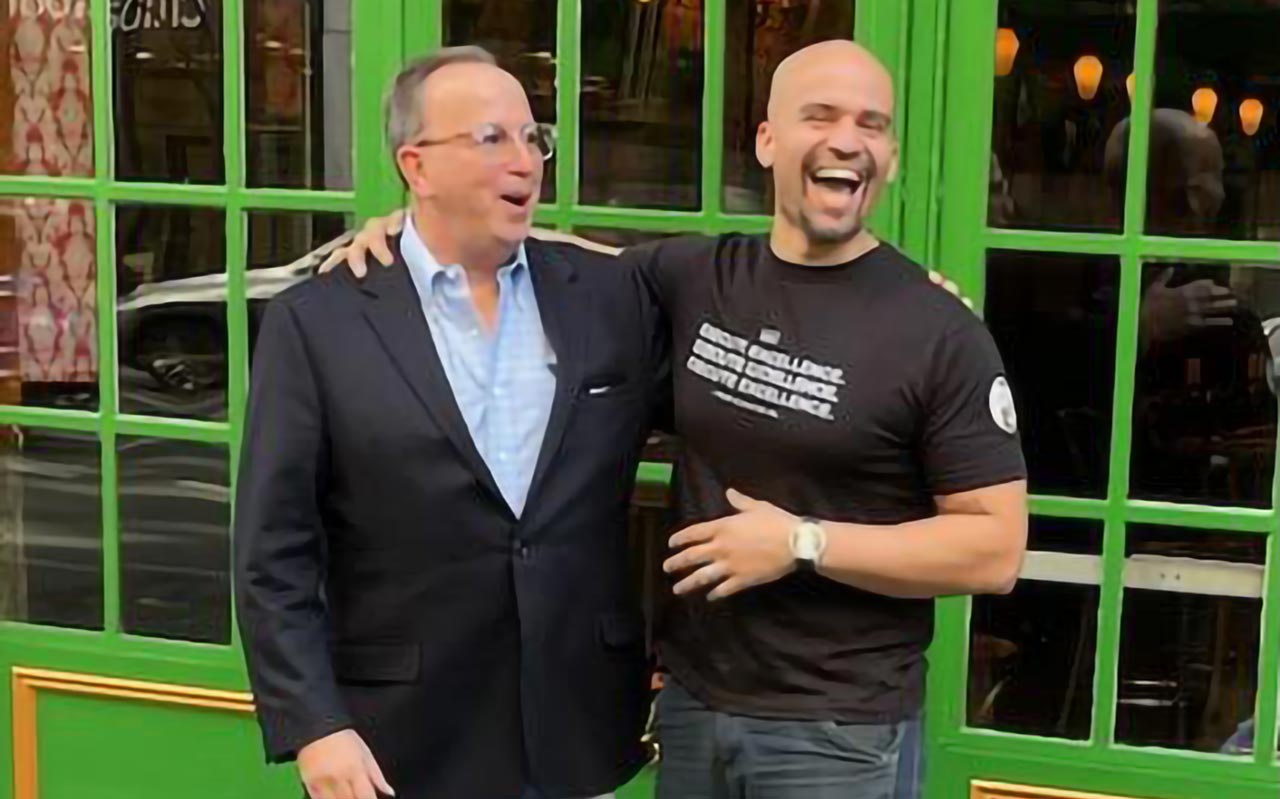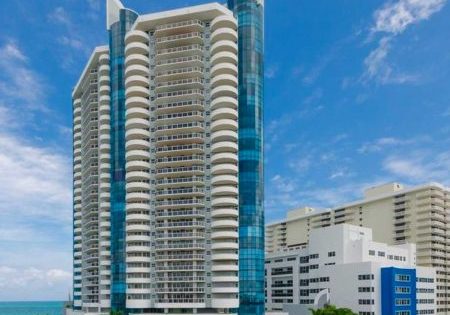10 Questions (Plus a Bonus) With “Your Elevator Pal” Ed Rivera
May 5, 2023

LinkedIn personality takes some time to answer your author’s questions.
I believe one of the hardest parts about writing this column is determining the next interesting person to answer my 10 questions. There are so many interesting people in our industry, and never a shortage of characters. A little while ago, one such character jumped out at me from the pages of LinkedIn: Ed Rivera, “Your Elevator Pal.” I know Ed from our mutual connections in the NYC elevator industry. He is now a regional trainer for modernization with TK Elevator (TKE), and very much believes the mantra, “Build elevators, build escalators, but, above all, build each other.” Is Rivera building a brand? I don’t know. But he believes that he is sharing education. Rivera is very serious about passing on his thoughts and wisdom to benefit the greater elevator industry and his 2,375 (and growing) LinkedIn followers. He is a person who is beyond passionate about not only his work but his home life, as well. To say I appreciate having Rivera sit down for a “10 Questions” would be a great understatement. We met up at one of his project sites in NYC, and I had a great time catching up and hearing his excellent answers.
MJ: Tell us how it all began.
ER: If you follow me on social media, you probably know me as “Your Elevator Pal.” What you probably don’t know is I was born and raised in a small, one-bedroom apartment in Brooklyn, NY, and that I knew since kindergarten that I would one day work with my hands for a living. I mean, the writing was on the wall. “Building blocks” was, without question, my favorite school subject, lol. This love is what led me to attend a vocational school — [William E. Grady Career and Technical Education High School in Brighton Beach, Brooklyn] to be exact. It was there I studied electrical. In fact, I later learned some of NYC’s most talented elevator mechanics also attended William E. Grady. Upon graduation, I was preparing to join either Con Edison, the Metropolitan Transportation Authority or the International Brotherhood of Electrical Workers Local 3 [in Flushing, NY]. All three organizations were frequent employers of William E. Grady electrical graduates. I had no clue such a thing as an elevator industry existed.
MJ: Tell me about your elevator career, from the beginning until now.
ER: While I was waiting to take exams and eventually hear back from those three organizations, I interviewed with what I thought was a company that built and worked on elevators. Lo and behold it was a vertical-transportation (VT) consultancy, and the job offered was that of a file clerk — not exactly what I had in mind, but I made the best of the opportunity. While working there, I made it my business to learn about the business. With that approach, growth, opportunities and relationships blossomed. One of those relationships was with the president of an elevator company who I later found out was also a Grady graduate. For me, the appeal and beauty of the aforementioned company was the fact it was founded, built and led by elevator mechanics. That resonated with me. It also didn’t hurt that it employed the industry’s most talented workforce — the International Union of Elevator Constructors (IUEC) Local One, a union of which I am still a proud member.
Mentoring is the single most important thing a seasoned professional can do.
— Ed Rivera
MJ: Even though you are a member of IUEC Local One, you’ve worked for both big and small companies and even had a short stint in the VT consultant world. Tell us what it is like working at each, their differences and how each affected your work life and habits.
ER: As I mentioned, I made it my business to learn this industry. In doing so, I took on and experienced a variety of growth opportunities and roles. To sum those up, I went from a file clerk to a junior project manager to a mechanic to a foreman to a general superintendent to a consultant to a foreman to my current role as a regional trainer at TKE. Honestly, I could probably write a book if I were to go into detail about all those experiences. What I can say, in short, is that each place of employment entrusted me with tremendous responsibilities and provided me the opportunity to grow.
MJ: You’ve upped your game by becoming a LinkedIn poster. You post almost every day. How do you fit it in?
ER: Although it may appear that way, posting daily isn’t a priority for me. There are some weeks when I put out content daily, and there are others when I don’t. When I do post, the posts come naturally, since a lot of my content is inspired by real-life conversations and experiences. I would say, at most, I spend 10 min creating a post.
MJ: Any backlash to your postings?
ER: No backlash, per se. I think what I post is honest and from the heart. Now, that doesn’t mean my messages are always received as such. That, however, is not something I can control, as we all view life through our own lens.
MJ: I’ve heard you referred to as the “Tony Robbins” of the elevator industry — nothing but positive vibes. Do you think of yourself that way?
ER: That is hilarious. I can’t say that I do. I think of myself as an elevator guy on LinkedIn who is simply sharing his passion about the profession. If it resonates with others, great. If not, oh well.
MJ: I’ve seen that you’ve included your daughter and wife in some of your posts. Any second thoughts about choosing to do so?
ER: No second thoughts. Work and family tend to be a large part of our lives, with family being the most important part and the part that is relatable across all professions. So, my occasional relatable post that includes family members seems appropriate.
At the end of the day, LinkedIn is a free, social media platform that, when utilized properly, can bring significant value to both our professional and social lives.
— Rivera
MJ: You’re big on mentoring in our industry. Who have been your mentors over the years?
ER: Mentoring is the single most important thing a seasoned professional can do. It’s how we, as a whole, can continue to elevate our industry. In no particular order, the following individuals have had the biggest impact on my professional development and will always hold a special place in my heart: Dan Nichuals, past owner and co-founder of BOCA Group; Joe Brown, lead construction superintendent at TEI Group; Wayne Locker, vice president, technical support and education, TEI group; John Fichera, former owner and executive vice president (EVP), modernization, TEI Group; Mark Gregorio, current owner and president, TEI Group with Mike Staub, EVP, operations; and Robert Monforte, president, operations, Champion Elevator.
MJ: You have more than 2,000 LinkedIn followers and so many more responding. What’s the end game? Where is Ed Rivera heading?
ER: Metrics are interesting, but they don’t drive me to create content. At the end of the day, LinkedIn is a free, social media platform that, when utilized properly, can bring significant value to both our professional and social lives.
MJ: Name three dinner guests you would want to sit down and have a conversation with.
ER: Elisha Otis, for obvious reasons. Andrew Carnegie. He embodied the American dream — the immigrant who went from rags to riches. William Edward Deming. He is widely acknowledged as the leading management thinker in the field of quality.
MJ: These answers are fantastic, so I’d like to add a bonus question. Your dinner guests — one is the originator of the elevator, one is a successful businessman and the last, a management quality guru. This leads me to ask where you think our industry is headed in relation to labor, safety, company expansion and elevator equipment.
ER: That’s a great question. I think it is business as usual for our industry. When you think about it, our industry isn’t overly complex. We’re basically providing and maintaining the “moving boxes” and “moving stairs” for our customers. Innovative technologies will continue to emerge, providing customers with unique solutions to their “people moving” problems. In addition, the industry will continue to provide the labor force with technological innovations to help streamline new installations. Safety will remain at the forefront of what we do.
Let’s talk about company expansions. It’s venture capital city in our industry right now. For better or worse, venture capitalists have taken a liking to our industry and have been investing heavily in the past five years or so. How these will all shake out is going to depend on the vision each investment group has. So, depending on where you sit, we can expect both great and not-so-great things to come out of these investments.
Regarding labor, the IUEC and National Elevator Industry Educational Program will remain the platinum standard for qualified VT mechanics. But other VT mechanic training programs are emerging. It will be interesting to see how all of these programs evolve.
To sum it all up, the beauty of our industry is our people: the weirdos like myself who are passionate about people, these “moving boxes” and “moving stairs,” continuous movement, developing the next and future generations, and who understand that, to be truly successful in the long game, we have to continue investing in and developing our people.
Get more of Elevator World. Sign up for our free e-newsletter.









